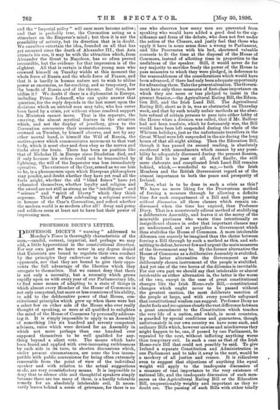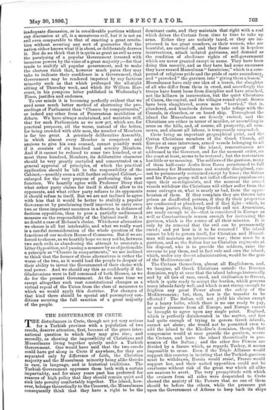PROFESSOR DICEY'S LETTER.
pROFESSOR DICEY'S " warning " addressed to Monday's Times is thoroughly characteristic of the man,—candid, earnest, impartial, and perhaps we may add, a little hypercritical in the constitutional direction. For our own part we have never in any degree denied that Unionists are bound to regulate their own conduct by the principles they endeavour to enforce on their opponents, nor that they are bound to give their oppo- nents the full advantage of the liberties which they arrogate to themselves. But we cannot deny that there is not only a necessity, but a necessity which grows rapidly upon us with every year of our Parliamentary life, to find some means of adapting to a state of things in which almost every Member of the House of Commons is not only competent, but more or less conscious of his ability, to add to the deliberative power of that House, con- stitutional principles which grew up when there were but a select few on either side of the House who ever really thought of speaking, or were at all qualified to enlighten the mind of the House of Commons by personally address- ing it. It is simply impossible to apply to an Assembly of something like six hundred and seventy competent aivisers, rules which were devised for an Assembly in which not more perhaps than one hundred ever supposed themselves to be well qualified for any- thing beyond a silent vote. The means which have been found and applied with ever-increasing ruthlessness by each side in its turn, to shorten discussions which, under present circumstances, are none the less incom- patible with public convenience for being often extremely reasonable from the point of view of the individual speaker and with relation to the actual suggestions m ide, are very unsatisfactory means. It is impossible to deny that to silence able and thoughtful speakers simply because there are too many of them, is a hardly tolerable remedy for an absolutely intolerable evil. It neces- sarily leaves behind a sense of grievance, for there is no one who observes how many men are prevented from speaking who would have added a good deal to the sig- nificance and force of the debate, who does not fret under the action of the Closure, and justly feel that those who apply it have in some sense done a wrong to Parliament, and. like Procrustes with his bed, shortened valuable counsels to fit the time at the disposal of the House of Commons, instead of allotting time in proportion to the usefulness of the speaker. Still, it would never do for any majority to sacrifice freely the power of the House to pass measures to which they were pledged, in deference to the reasonableness of the considerations which would have been advanced, if there had only been adequate opportunity for advancing them. Take the present situation. The Govern- ment have only three measures of first-class importance on which they are more or less pledged to insist in the present Session,—the Agricultural Rating Bill, the Educa- tion Bill, and the Irish Land Bill. The Agricultural Rating Bill, short as it is, was so obstructed on Thursday week, and that by such totally unfair methods as the abso- lute refusal of certain persons to pass into either lobby of the House when a division was called, that if Mr. Balfour had not been resolute, which he fortunately was, the Bill would have been left suspended during the whole of the Whitsun holidays, just as the unfortunate travellers in the Great Wheel were left suspended in the air during the long hours of that all-night sitting. Then the Education Bill, though it has passed its second reading, is absolutely smothered with amendments which cannot by any possi- bility be adequately discussed during the present Session, if the Bill is to pass at all. And finally, the still more elaborate and complicated Irish Land Bill remains behind, which,—wonderful to say,—both the Irish Members and the British Government regard as of the utmost importance to both the peace and prosperity of Ireland.
Now, what is to be done in such a crisis as this ? We have no more liking for the Procrustean method of forcing a measure through by allowing a definite time for each compartment of a Bill and then passing without discussion all those clauses which remain un- discussed when the time has expired, than Professor Dicey. That is a monstrously odious method of stultifying a deliberative Assembly, and leaves it at the mercy of the miserable partisans who waste time intentionally on insignificant clauses in order that important clauses may go undiscussed, and so prejudice a Government which thus stultifies the House of Commons. A more intolerable dilemma can scarcely be imagined than the choice between forcing a Bill through by such a method as this, and sub- mitting to defeat, however fewand urgent the main measures of the Government may be. By the former alternative the House of Commons as a deliberative Assembly is stultified. By the latter alternative the Government as the deliberately chosen instrument of the people is stultified.. And yet one of the two horns of the dilemma is inevitable. For our own part we should say that intolerable or almost intolerable as either alternative is, the latter is the worse of the two, except in the case of great constitutional changes like the Irish Home-rule Bill,—constitutional changes which ought never to be passed without the greatest caution, the most deliberate sanction of the people at large, and with every possible safeguard that constitutional wisdom can suggest. Professor Dicey no doubt feels and recognises clearly the vast difference between a great amendment to the Constitution which touches the very life of a nation, and which, in most countries, is guarded by special conditions and guarantees, though unfortunately in our own country we have none such, and ordinary Bills which, however unwise and mischievous they might happen to be, can, if passed by one Parliament, be repealed by the next, without inflicting anything worse than temporary evil. In such a case as that of the Irish Home-rule Bill that could not possibly be said. To give Ireland a separate Constitution and Administration in one Parliament and to take it away in the next, would be a mockery of all justice and reason. It is ridiculous even to suggest that objections of anything like equal weight will apply to the inadequate discussion of a measure of vast importance to the very existence of national life, and the inadequate discussion of such mea- sures as the Agricultural Rating Bill or the Education Bill, unquestionably weighty and important as they no doubt are. The passing of such Bills with either totally inadequate discussion, or in considerable portions without any discussion at all, is a monstrous evil, but it is not an evil even comparable to that of enacting a great revolu- tion without securing any sort of guarantee that the nation either knows what it is about, or deliberately decrees it. Nor do we think that it is quite as great an evil as even the paralysing of a popular Government invested with immense powers by the voice of a great majority ;—for that tends to stultify all popular government, and to make the electors think that, however much pains they may take to indicate their confidence in a Government, that Government may be rendered impotent by any factious minority such as that which prolonged the all-night sitting of Thursday week, and which Sir William Har- court, in his pompous letter published in Wednesday's Times, justifies and endorses.
To our minds it is becoming perfectly evident that we need some much better method of shortening the pro- ceedings of Parliament than "Closure by compartments," or indeed any other form of Procrustean mutilation of debate. We have always maintained, and maintain still, that for such Parliaments as we now get, which are, for practical purposes, all the worse, instead of the better, for being crowded with able men, the number of Members is far too great. A genuinely deliberative Assembly, in which almost every Member is competent and anxious to give his own counsel, cannot possibly work if it consists of six hundred and seventy Members. And if it cannot be reduced to some two hundred, or at most three hundred, Members, its deliberative character should be very greatly curtailed and concentrated on a general approval of principles, of which the practical application should be left to the responsibility of the Cabinet,—possibly even a still further enlarged Cabinet,— enlarged for the very purpose of performing this new function. We heartily agree with Professor Dicey that what either party claims for itself it should allow to its opponents, and what either party refuses to its opponents it should refuse to itself. But we are not inclined to agree with him that it would be better to stultify a popular Government by proclaiming itself impotent to carry even two or three important measures in a. Session in defiance of factious opposition, than to pass a partially undiscussed measure on the responsibility of the Cabinet itself. It is no doubt a case of Hobson's choice. Whichever alternative we choose is all but intolerable, and what we really want is a careful reconsideration of the whole question of the functions of our modern House of Commons. But if we are forced to choose, as we heartily hope we may not be, between two such evils as abandoning the attempt to over-rule a bitter Opposition, and passing a measure by so objectionable a principle as "Closure in compartments," we are inclined to think that the former of these alternatives is rather the worse of the two, as it would lead the people to despair of their ability to invest the Government of their choice with real power. And we should say this as confidently if the Gladstonians were in full command of both Houses, as we do for the present Government. At the same time we except altogether such vast constitutional changes as a virtual repeal of the Union from the class of measures to which we would apply this doctrine. For changes of that kind there should be special and peremptory con- ditions securing the full sanction of a great majority of the people.



































 Previous page
Previous page